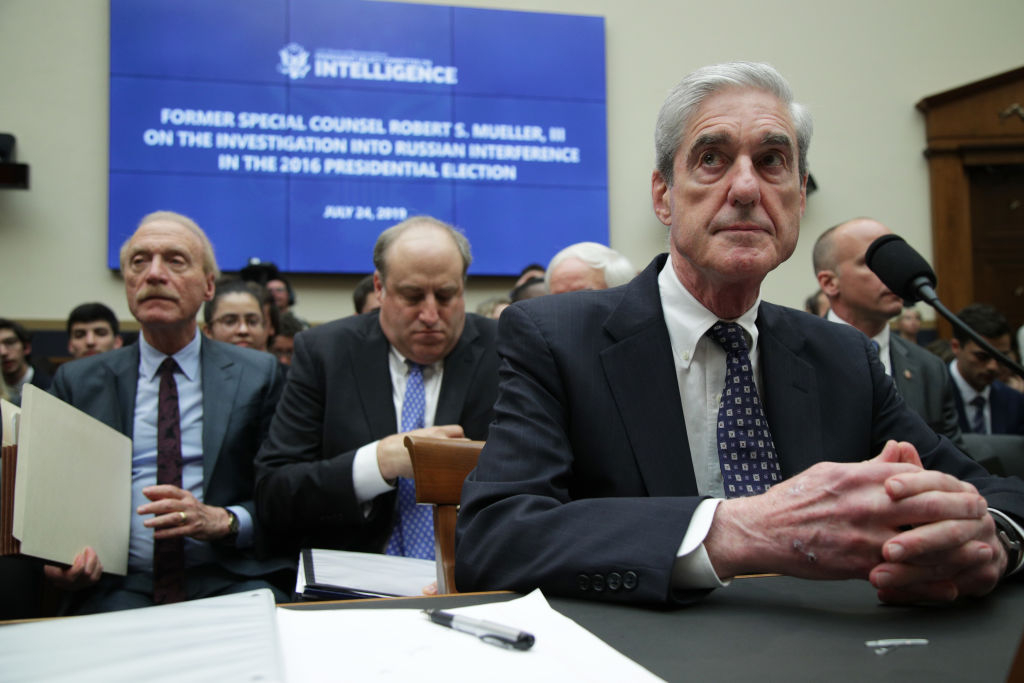 Robert Mueller's performance in front of Congressional committees should mark the end of special counsels, special prosecutors, independent counsels and the like. These hearings demonstrated, if any further demonstration was required, how dangerous it was to go outside of the normal processes of criminal justice. Pictured: Mueller (front) testifies before the House Intelligence Committee on July 24, 2019 in Washington, DC. (Photo by Alex Wong/Getty Images) |
Robert Mueller's performance in front of Congressional committees should mark the end of special counsels, special prosecutors, independent counsels and the like. These hearings demonstrated, if any further demonstration was required, how dangerous it was to go outside of the normal processes of criminal justice.
Ordinary prosecutors are not allowed to comment about why they decided not to prosecute the subject of an investigation. The Mueller Report, when made public, violated that salutary tradition. It contained negative information about people, including the president, who will have no opportunity to respond in a legal proceeding.
The report and the testimony introduced the novel and dangerous concept into our legal vocabulary: "Not exonerated." This concept, which finds no basis in the rules of the Justice Department or the Special Counsel, is a variation on the nefarious theme articulated by the disgraced former FBI director, James Comey, when he went beyond announcing that Hillary Clinton would not be prosecuted, and expressed his opinion that she had been extremely careless in her treatment of emails. This statement said, in effect, that Hillary Clinton was not being exonerated.
Mueller's testimony was confused and confusing on many scores. He couldn't explain why he had reached a formal decision on conspiracy with Russia but had failed to reach a formal conclusion about obstruction of justice. He had to pull back on his answer to whether the decision not to charge the President was based on a Justice Department policy against indicting a sitting president. There was no explainable pattern as to why he chose to answer some questions while declining to answer others. He seemed not to be familiar with the contents of the Report that bears his name. It was almost as if he had signed his name to the Report without carefully reading or understanding it.
The night before Mueller's testimony, I was asked on a TV show whether it was a Hail Mary pass thrown by the Democrats. I predicted that it would be an intercepted pass. I was right. Even many Democratic stalwarts viewed the Mueller testimony as harmful to their cause. As a liberal Democrat, I share that view and it doesn't please me. But as a patriotic American, I care far more about the implications of the Mueller testimony for all Americans and for the rule of law.
The only good that can come from this testimony is that the millions of Americans who watched, or who will see and read excerpts, will come to understand how dangerous the Office of Special Counsel is to the rule of law. From day one, I proposed an alternative: namely the appointment of a nonpartisan expert commission whose job it is to investigate the role of Russia in trying to influence American elections and to influence our American democratic processes. Like the 9/11 Commission, this Russia Commission would not be pointing prosecutorial fingers for past derelictions, but would be focused primarily on preventing Russia from continuing to influence our American political processes. Prosecutors, like the Special Counsel, operate behind closed doors and in secret. They hear only one side of the story. They are restricted in what Grand Jury information can be made public. Non-partisan expert commissions, on the other hand, operate primarily in public (except when hearing classified material) and hear all sides of every issue in an effort to hear the whole truth.
So let's rethink how we deal with problems such as those that were the subject of the Mueller Report and Mueller's testimony. Let's learn from our mistakes and let's stop weaponizing our criminal justice system for partisan ends. Congress and the Justice Department should abolish the Office of Special Counsel, just as they abolished the Office of Independent Counsel after the fiasco of the Starr Report.
Alan M. Dershowitz is the Felix Frankfurter Professor of Law Emeritus at Harvard Law School and author of The Case Against the Democrats Impeaching Trump, Skyhorse Publishing, 2019. He is a Distinguished Senior Fellow at Gatestone Institute.


